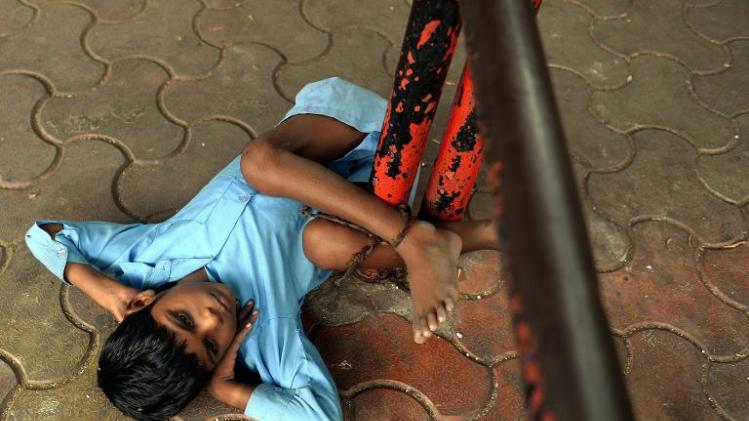Mumbai (AFP) - The nine-year-old boy dressed in blue lay listlessly on the pavement in the scorching Mumbai summer afternoon, his ankle tethered with rope to a bus stop, unheeded by pedestrians strolling past.
Lakhan Kale cannot hear or speak and suffers from cerebral palsy and epilepsy, so his grandmother and carer tied him up to keep him safe while she went to work, selling toys and flower garlands on the city's roadsides.
"What else can I do? He can't talk, so how will he tell anyone if he gets lost?" said homeless Sakhubai Kale, 66, who raised Lakhan on the street by the bus stop shaded by the hanging roots of a banyan tree.
Lakhan's father died several years ago and his mother walked out on the family, his grandmother told AFP.
A photograph of him tied up appeared in a local newspaper this week, sparking concerns among charities and the police, and he has since been taken into care at a government-run institution.
But activists say his plight on the streets comes as little surprise in India, where those with disabilities face daily stigma and discrimination and a lack of facilities to assist them.
Kale said Lakhan "tends to wander off" and that there was no one else to stop him walking into traffic while she and her 12-year-old granddaughter, Rekha, were out making a living.
At night she would tie him to her own leg as they slept on the pavement so she would know if he tried to walk away.
"I am a single old woman. Nobody paid attention to me until the newspaper report," she said.
"He was in a special school, but they sent him back."
Social worker Meena Mutha has since managed to place Lakhan in a state-run south Mumbai home, which takes in a range of needy children from the disabled to the destitute.
"Residental homes are very, very few. There's a major need for the government to do something, a social responsibility to provide residential centres for children like Lakhan," said Mutha, a trustee at the Manav Foundation helping people with mental illness.
She said government-run centres that put together children with different needs did not always have the range of facilities required.
"They don't have the infrastructure, the staff," said Mutha. Conversely, non-government organisations "have expertise, but not the space," she said, highlighting the squeeze on land in the densely-packed city.
Across India, the 40 to 60 million people with disabilities often face similar struggles to get the help they need, activists say.
"There's no collective responsibility. You have a disabled child, you look after it," said Varsha Hooja, chief executive at ADAPT, another charity working with disabled young adults and children.
- No state support -
Hooja said she had seen other cases of parents locking up children with disabilities while they go to work.
"The state gives no support," she said.
A long-awaited bill was introduced into the Indian parliament in February aiming to give disabled people equal rights -- including access to education, employment and legal redress against discrimination -- but it has yet to be passed.
Lawyer Rajive Raturi was on the committee that began drafting the bill five years ago, and said the Congress party-led government which has just lost power had pushed through a "complete dilution" of the original, especially on sections regarding women and children with disabilities.
Raturi, who handles disability cases at the Human Rights Law Network, said he hoped the new parliament elected this month, dominated by incoming prime minister Narendra Modi's right-wing Bharatiya Janata Party, would "listen to the stakeholders and then make a decision".
"We can't change attitudes with an act but if the bill has the right provisions, people will think twice," he said.
Back by the Mumbai bus stop, Kale squatted on the pavement drinking chai and eating bread on the morning after bidding a tearful goodbye to her grandson.
She was hopeful she would get to see him regularly once she acquired an official identity card that would allow her to visit the centre.
"I am very happy," she said. "What else would I want other than for him to be looked after?"








How heart breaking is this?? It's just horrible that there is no help from the State.
Yup, heartbreaking.
The poor Grandmother has no choice it seems...how pitiful. I must say though, the boy looksas though he'staken care of by his Grandmother.. (clean, and clean clothes)
Another one of the ''lost ones''...Sad, but as you said Tzia, he looks well taken care of.
The whole thing is a huge social issue in India. In Mexico, too, being an orphan or disabled child can be a horrible life.
Yes, he appears to be well fed and clean. Thank God for that!
It does seem drastic, for sure.
It's heartbreaking.